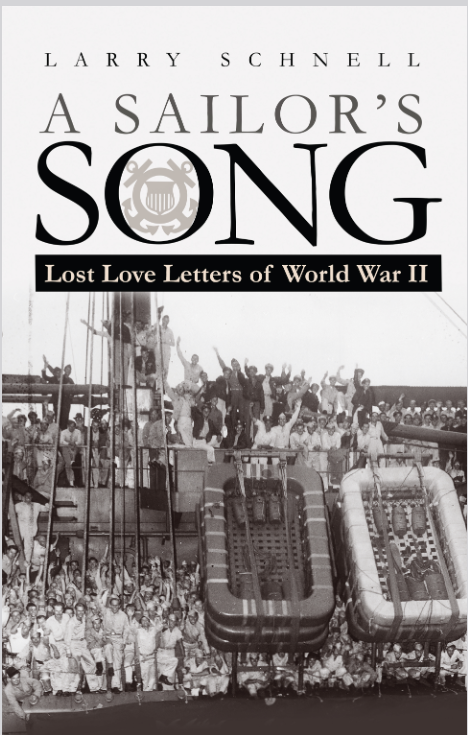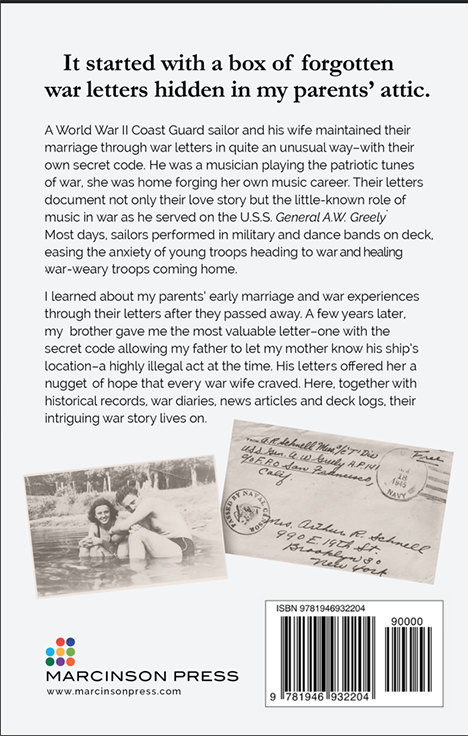Instruments of War
A dozen Coast Guard sailors arrived at their new station in Alameda,
California, prepared to take up weapons of choice—musical
instruments—
against the Japanese. The Manhattan Beach Training Station musicians
would soon board a ship destined for ports in the Pacific. Their new
role in
the war began with chaos and uncertainty on arrival at the Naval Air
Base in Alameda in early March 1945.
There was little to do at first other than muster twice a day, play
cards, wait, wonder, worry. The band members hoped they would, in
some capacity, function as a band, but they had no band leader.
Surely, they were not assigned to the portal of the Pacific War to
just play music. They passed the time and tried to thwart
uncertainty with dinners in Oakland, second-rate movies,
sightseeing, and card games. Several musicians spent a comfortable
night as guests of the San Francisco band, one of ten regional Coast
Guard bands formed during the war. Their gratitude to the San
Francisco band was tempered by a nagging question: Why was the San
Francisco band continuing its musical war role while the Manhattan
Beach band was gutted and its leading musicians, shipped out? Was it
the image of the white dress uniforms and polished shoes they wore
as they marched and played in Manhattan streets while bloodied
soldiers fought in grim conditions? Was it a sense of privilege they
assumed and at times flaunted as they horsed around far from combat
zones? Was it triggered by an inappropriate incident involving a
drumstick that occurred while the band was being reviewed by an
admiral a week or so before they were ordered to California? While
band members speculated and differed over the causes of their
transfer, they ignored the Coast Guard’s preeminent reason—the war.
They left wives behind in New York with barely a goodbye. The wives
quickly bonded as a support group to endure the absence and anxiety
over their husbands’ new role in the war. The musician-sailors
bonded over the confusion and anxiety of their new assignment.
The Alameda Naval Air Station was created just in time for World War
II and expanded throughout the war to accommodate air units, carrier
groups, supplies, Naval personnel, and this new crew of Coast Guard
musicians.
The Manhattan Beach band musicians settled into the barracks while
they awaited word of their new roles as the war dragged on. They
learned they would serve on the U.S.S. General A.W. Greely,
a new ship of which they knew little and even less about its
destinations. What would band members do on the Greely, play
music, fire guns, man landing vessels, attack Japanese ships? Rumors
flourished amid news of the Coast Guard’s and Navy’s roles in the
Battle of Iwo Jima, in progress as the musicians arrived in San
Francisco. Some 7,000 Marines died taking the island. Was that a
foreshadowing of their mission? Were they to play a role in taking
Okinawa, the next teppingstone en route to the Japanese mainland? If
the Greely were to serve as an attack transport—a rumor
prompted by the 5-inch guns fore and aft—she could be a high-profile
target for artillery on Japanese shores. As reliable information
seeped in, band members learned the Greely was not an attack
transport. She was a troop transport, a ship that delivered troops
to staging areas, not beachheads. The musicians’ relief was brief.
Where were the staging areas? Rumors flew furiously. Some said the
destination was India, which involved sailing through hostile waters
of the Pacific and Indian oceans. Others said Australia, a
relatively safe location if the ship could evade torpedoes along the
way. Musician Art Schnell, an optimist at this point, believed they
were headed for Hawaii. Or maybe, if Germany surrendered, the Greely
would sail the Atlantic, bringing troops home from Europe and
docking in New York Harbor not far from wives of the Greely
musicians. In a flurry of letters between San Francisco and New
York, wives and musician-sailors exchanged hopes and fears while
they sought reliable information amid the uncertainty of war.
Finally, a band leader showed up and called a rehearsal, relieving
musicians of idle time to churn the unknown into anxiety. Harold
Brody had to get the band in shape quickly as the musicians would
perform for the Greely commissioning, a formal event
attended by officers of the Navy, Army, Coast Guard, and Marines as
well as political dignitaries. The band sounded ragged during the
first rehearsal, but the Manhattan Beach musicians were among the
best and would get it together for the big event. After that, they
would play for crew loading the ship. As they helped prepare the Greely
for its maiden voyage, they observed and shared bits of good
news—musical
instruments were among the cargo.
Band members did not know how they came to be known as the Greely
Grenadiers, but after it was mentioned at a performance and
published in the ship’s newsletter, it was official. Although some
musicians did not like the name, they liked the implication that the
band would play while the ship was at sea, that music had a role in
war. They would soon learn that soldiers awaiting deployment could
enjoy calming or inspirational music. That same music could sooth
the minds of soldiers returning from years of battle.
By the end of the Greely’s voyages, after
destination rumors had been replaced by travelogue, after fresh
troops had been delivered and war-weary
troops returned to their families, the Greely would earn a
reputation for distinguished voyages and service to veterans.
By the war’s end, the Greely had completed a
circumnavigation via India, three additional trips to India and
other Pacific destinations, and two transatlantic crossings. A Greely
newsletter proclaimed the ship’s first trip to Pacific destinations
the longest maiden voyage for a warship—almost 13,000 miles—and the
longest voyage for a troop transport. Many of more than 10,000
passengers on return voyages were among the longest serving troops
in the war. Returning from France, she repatriated the 2nd Infantry
3rd Division (Red Diamond) after its troops helped drive the Nazi
armies out of France and back to Germany. Returning from her second
Pacific voyage, the Greely brought home Merrill’s Marauders
after two years in the jungles of Burma, the Flying Tigers, after
almost four years in China, the U.S. Army engineers who built the
Ledo Road through Burma, the Kachin Rangers who fought the Japanese
with help from indigenous people, and other service groups. These
famed fighters debarked the Greely in New York to the cheers
of thousands and to the music of the Greely Grenadiers, the
band that earned her recognition as the only military ship to have
its
own band aboard from the day of commissioning.
The Greely also delivered mail—ship to shore and shore to
ship, thousands of pounds on each voyage. Letters were the only
means for sailors and soldiers to keep in touch with loved ones. The
Manhattan Beach musicians joined millions of Americans writing
letters that were packed in mail sacks and transported throughout
the world in the holds of ships like the Greely. Couples
struggling to maintain a marriage in the uncertainty of war relied
on letters to share their hopes for the future, for themselves, and
for a nation. Letters from troops in war zones encouraged optimism
for loved ones as they portrayed a lifestyle as remote from the
reality they left behind as the distance separating them. Those in
combat found comfort, encouragement, and hope in letters shipped to
distant military bases and battlefields with the hope that the
receiver would be alive to read them.
Kimberly Guise, senior curator at The National WWII Museum in New
Orleans, studied thousands of letters to and from troops separated
from families by World War II. Letters are primary sources that tell
enduring stories of the personal side of the war. “These singular
resources will survive far beyond the time when the last WWII
veteran has passed,” she wrote. “The information they provide is
immediate, requiring no instruction about how to interpret them.
They speak for themselves. Each piece tells us something new, adding
a unique personal vision to the immense story of World War II.”
The exchange of letters between Arthur R. Schnell, Musician 3rd
Class, and wife, Florence, reveals much more than the personal
aspects of war.
The couple was committed to a life of music, and the information
they exchanged reflects the importance of music in the military and
on the home front. Flo’s letters describe a woman taking charge of a
range of issues from disentangling her 1933 Plymouth coupe from a
fender-bender to managing a musical career in the absence of her
husband. Art’s letters provide an intriguing inside look at the role
of music in war, on a military base, and on a ship. His letters
describe the personalities, talents, and temperaments of the
musicians who turned passion into patriotism. Together with
historical records, the Greely War Diaries and Deck Logs,
newsletters, and news articles, these letters portray the importance
of music in supporting the war, troops, and home-front families.
While millions of war letters between loved ones were written,
mailed, and shipped, Arthur Schnell received the first letter from
his wife on March 14, 1945, more than a week after arriving in San
Francisco. “This afternoon I received the first letter that anyone
in the band has received since coming out here, and was I proud,
which just proves that my darling is the best ‘Mousie’ (the couple’s
term of endearment),” he replied.
In early April, musicians were ordered to pack their bags, as they
were leaving in twenty minutes for Treasure Island to train and
prepare for an accelerated shakedown cruise. Letters would be
censored, Art warned. “Naturally while we are on board, our mail
will be censored so remember the code,” he wrote in a letter mailed
from a Post Office in San Francisco beyond the eyes of censors. When
I first read the letters, I had no idea what code my father was
referring to. |


|
A Sailor's Song on the air

IPM News public radio Champaign-Urbana explores the themes of
music, war letters, love in an interview with Larry Schnell,
author of A Sailor’s Song: Lost Love Letters of World War II,
April 4, 2025.
217 Today: How a
hidden box of love letters became a historical memoir of WWII,
with Anna Koh.“In today’s deep dive, we’ll learn about a new
memoir from local author Larry Schnell that explores the
little-known role of music in war.”
https://ipmnewsroom.org/217-today-how-a-hidden-box-of-love-letters-became-a-historical-
memoir-of-wwii/

When The Moon Sings
WRUU Savannah with host P.T. Bridgeport explores the importance of
music and letters in World War II with Larry Schnell, author of A
Sailor’s Song: Lost Love Letters of World War II, April 19, 2025.
Mr. Bridgeport, whose father served in World War II and was a
prisoner of war, provided an excellent forum for discussion of the
recently published book, focusing on both military and home-front
morale.
“You are providing people with a sense of what it was like to be
in the war both from the military perspective and the civilian
perspective.” https://www.wruu.org/broadcasts/57603/
A Sailor’s Song: Lost Love
Letters of World War II is a welcome look at the 40s,
America in the world war,
one family’s separation and survival, and the Coast Guard. It is a
nostalgic
and poignant look that makes me proud to be an American. It was a
time when our
people put aside their political, social and economic issues, and
fought
together to lead the world to triumph over fascism. Based on his
father’s
correspondence with his mother while he served in the Coast Guard,
Schnell’s
readers are fortunate to have this story of life at sea and the
home front
during the war. A Sailor’s Song is solid cultural history
and, more
important, a very readable story that anyone interested in the
Greatest
Generation will enjoy.
Dr. Robert L. Gold, Ph.D.
Historian, professor, author
This is a lovely gem of a story about band
music and love
letters exchanged in wartime between the author’s parents
Arthur and Florence Schnell.
Art, a music teacher and trombonist, enlisted to serve in the
Manhattan Beach Coast
Guard Band during WWII. He
and an elite group
of his fellow musicians travel to California for deployment on
the USS A.W.
Greely, a newly built personnel transport ship which
served the China, Burma
and India theatre of operations. Their
primary
role was to provide entertainment to troops and support staff
on route
to war arenas, and comfort to those headed home after enduring
deprivation,
injury and trauma. The author blends the love story between
his parents,
separated by Art’s wartime deployment, with the rigors of
working on a naval transport
ship that, from 1945-1946, sailed through the Pacific, Indian
and Atlantic
Oceans, and circumnavigated the world to transport troops,
supplies and mail.
We are amused to read Art’s carefully coded
letters, in
which he secretly revealed his geographic locations to his
wife, to evade the
watchful eyes of the censors. Author Schnell explains the
complexities of delivering
mail to service members throughout the world. We also learn
how Florence,
affectionately called Flo, dealt with the absence of her
husband, while sharing
an apartment with another deployed musician’s wife. Flo was a
working musician
and teacher, and she gained an additional sense of
independence and strength during
Art’s absence, yet she devotedly maintains a steady
correspondence with him.
A blend of narrative nonfiction and
historical memoir,
A Sailor’s Song provides the reader with detailed
information of the
role of musicians in the US Coast Guard. It
is a glimpse into the love story of two people
separated by war yet determined to keep their romance alive.
Susan Waller Lehmann, Author, Private
Investigator, Journalist
|




